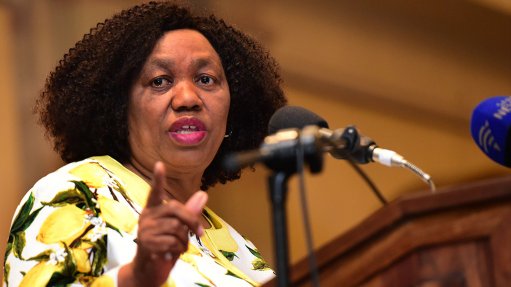
Basic Education Minister Angie Motshekga
Programme Director
His Excellency, the Right Honourable Prime Minister of Lesotho,
Dr Motsoahae Thomas Thabane;
Honourable Minister of Education and Training in Lesotho, Professor Ntoi Rapapa;
Honourable Commissioner: Human Resources, Science and Technology, African Union Commission, Her Excellency, Professor Sarah Anyang Agbor;
President of the AFTRA, Mr Mabutho Cele and your Management Team and the Executive Board;
The AFTRA Honorary Life Members and the AFTRA Fellows, 2010-2019;
Fellow Ministers responsible for Education from the African Continent and abroad;
Distinguished guests, Ladies and Gentlemen;
The 10th Anniversary, the 8th Teaching and Learning in Africa Conference, and the 10th Roundtable – all coordinated under the auspices of the Africa Federation of Teaching Regulatory Authorities (AFTRA), mark an important milestone, since the adoption of the UNESCO / ILO recommendations on the status of teachers in 1966, where teaching was officially recognised as a fully-fledged profession.
The journey to improve access, equity, redress, inclusivity, quality and efficiency of education systems in the African Continent, has been long and tedious, but necessary and unavoidable. Despite the huge investments made by Governments in the African Continent have made into the education systems, we continue to lag behind other countries in Europe and Asia, particularly when it comes to the performance of our learners in the regional and international benchmark studies.
Of course, this only applies to those countries that are participants of such regional and international benchmark studies.
The role that is expected to be played by our teachers to transform, develop and improve our education systems, remains enormous. Despite the acute shortage of educational resources in many African countries, teachers remain the single critical resource and our hope. It is therefore important, that as African countries, we work together to ensure that we attract into the teaching profession, young and excellent students to become teachers. We have to work hard to ensure that the working environments and conditions of service for our teachers are improved, and that teachers are empowered with the skills, knowledge and competencies necessary for the changing world.
Education remains the most critical catalyst that will propel the African Continent towards the attainment of its development goals. The UNESCO Sustainable Development Goals (SDGs), especially SDG 4 on education, as well as the Continental Education Strategy for Africa (CESA, 2016 – 2025), have placed the provision of quality and efficient education systems at the centre. African governments have to work together through the African Union, UNESCO and other development partners, like AFTRA, to ensure that the image and status of the teaching profession is uplifted, and that the teaching profession is fully professionalised.
On behalf of my fellow recipients of the 2019 AFTRA Award of Fellowship, I want to take this opportunity to congratulate the AFTRA for continuing to wage the struggle to ensure that teaching becomes truly professionalised. The mission of AFTRA, to ensure that all African countries establish Teacher Regulatory Authorities, is a noble one, and we must all encourage fellow Ministers of Education to support this noble course.
Furthermore, as recipients of this prestigious award, we wish to thank the AFTRA for acknowledging and recognising the contributions that we have made in our various capacities, to ensure that our education systems in the Africa Continent, espouse and are anchored on the social justice principles of access, equity, redress, inclusivity, quality and efficiency. We acknowledge that a lot has been done, but there is a lot we still have to do. We must continue to be good ambassadors of education and training systems in our various countries. This must be inclusive of Early Childhood Development (ECD), and inclusive education for learners with special educational needs. We must continue to work together to ensure that the commitments we have made through our various protocols, are fulfilled.
In conclusion, may I thank the Government of Lesotho for hosting the 10th Anniversary, the 8th Teaching and Learning in Africa Conference, and the 10th Roundtable – all coordinated under the auspices of the AFTRA.
I also wish thank the AFTRA Executive Board and Management Team for considering us as worthy recipients of this prestigious Award of Fellowship. This Award will propel us to double our efforts in ensuring that our African children – our continental assets, are exposed to the best education systems possible; and that through our education systems, and our decolonised and diversified curricula, our learners attain the skills, knowledge and competencies for a changing world and the Fourth Industrial Revolution.
I thank you